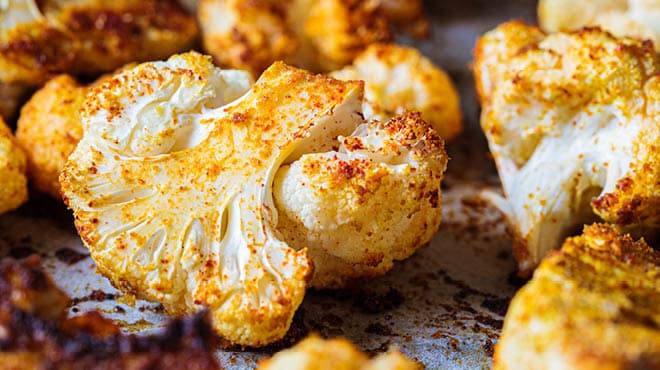-
Cauliflower: A versatile nutrition superstar

Like many consumers, you may be on a quest for healthier food options and willing to try something new or a new take on a familiar food. If you're diagnosed with celiac disease, you may be looking for gluten-free alternatives. Or maybe you're on the hunt for lower carbohydrate choices.
Cauliflower may be just what you're searching for. This versatile veggie can be eaten raw, cooked, roasted, grilled, baked into a pizza crust, or cooked and mashed as a substitute for mashed potatoes. You can even rice cauliflower and serve it in place of white rice.
Cauliflower is a member of the cruciferous vegetable family along with Brussels sprouts, cabbage, broccoli, collard greens, kale, kohlrabi, rutabaga, turnips and bok choy. These vegetables all contain a compound that produces a strong, distinct odor that some find unappealing. But this family of vegetables also offers a wide range of health benefits and may reduce the risk of various types of cancer.
Nutrition superstar
When it comes to nutrition, cauliflower is a superstar. It's high in vitamins C and K, and is also a good source of folate, which supports cell growth and is essential during pregnancy. Cauliflower is fat-free and cholesterol-free. And it's low in sodium. A one-cup serving contains only 25 calories, 5 grams of carbohydrates and 2 grams of dietary fiber.
Choosing cauliflower
Look for a cauliflower head that has tight, creamy-white curds and bright-green, firmly attached leaves. Avoid those with brown spots or loose, spread-out sections.
Buy a head of cauliflower and separate it into its sections or florets. Or for convenience, purchase a tub of washed, precut florets. Cauliflower wrapped in a cellophane bag can trap moisture and speed up spoiling. Unwrap and transfer cauliflower to a loosely sealed bag with a paper towel to help absorb moisture. Whole heads of cauliflower can be stored in the fridge for four to seven days.
To bring more color to side dishes, salads and snacks, try green, orange or purple cauliflower.
New takes on a familiar veggie
As you look for ways to add more veggies to your plate, give cauliflower a try. Toss florets into a food processor to make a cauliflower pizza crust, or mince into small pieces for your next stir fry. And be sure to involve the kids so they learn to try this familiar veggie in new ways.
This recipe puts a cauliflower twist on a popular side dish. Make it plant-based by leaving out the cheese.
Parmesan roasted cauliflower
Serves 6
1/2 cup panko breadcrumbs
1/4 cup finely grated Parmesan cheese
2 tablespoons olive oil
1 teaspoon fresh lemon zest
1 teaspoon finely chopped fresh basil
1/4 teaspoon paprika
1/4 teaspoon kosher salt
3 cups small cauliflower florets
Fill a medium pot with water and bring to a boil. Heat oven to 375 F. Lightly coat an 8-by-8-inch baking dish with cooking spray.
In a small bowl, combine the breadcrumbs, cheese, oil, lemon zest, basil, paprika and salt until well mixed.
Place the cauliflower in boiling water for three minutes; drain. Place in the baking dish and sprinkle the breadcrumb mixture evenly over the top. Bake for about 15 minutes or until crust is lightly brown.
Nutritional information for 1/2-cup serving: 84 Calories, 6 grams total fat, 1 gram saturated fat, 0 grams trans fat, 4 grams monounsaturated fat, 3 milligrams cholesterol, 163 milligrams sodium,6 grams total carbohydrate, 1 gram dietary fiber, 1 gram total sugars, 3 grams protein
Caitlin Terpstra is a dietitian in Nutrition in Owatonna, Minnesota.
This article was originally published on the Mayo Clinic Health System Hometown Health blog.
Related Articles






